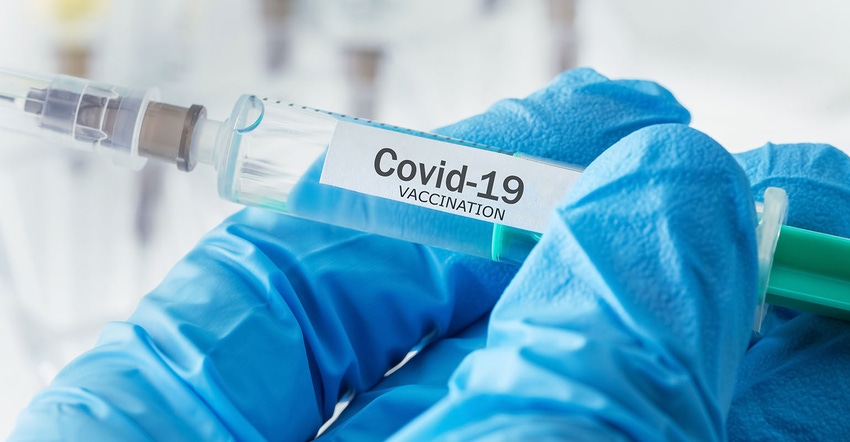
With the first shipments of the Pfizer/BioNTech vaccine scheduled to arrive December 15 and Moderna doses soon after, a big question looms: who gets them first? The North American Meat Institute and National Pork Producers Council urged federal authorities to highly prioritize COVID-19 vaccination for the men and women who work in the meat and poultry industry, following healthcare workers and those in long-term care facilities.
The CDC Advisory Committee on Immunization Practices held an emergency virtual meeting on December 1 to determine allocation of the initial doses of COVID-19 vaccines. They voted 13-1 to recommend that the first doses are given to health care workers, including those in long-term care facilities, and residents of nursing homes and long-term care facilities—about 24 million Americans. Within the CDC’s prioritization recommendations, states will make the final decisions.
After the U.S. Food and Drug Administration advisory committee meets to discuss emergency use authorization of the Pfizer/BioNTech vaccine on December 10 and Moderna vaccine on December 17, ACIP will meet again to make final recommendations on how each should be used within the prioritized populations. This is the key independent recommendation that matches each vaccine to the best population to receive it.
ACIP will also meet over the next few weeks to discuss recommendations for subsequent vaccination phases—likely to include essential workers and adults with multiple chronic conditions putting them at risk of severe COVID-19 illness. NPPC says it supports the CDC’s recommendation placing food and agricultural workers in Phase 1B.
The National Academies of Sciences, Engineering and Medicine released a final report on how to allocate vaccines. They suggested that Phase 1B cover approximately 10% of the population and includes people of all ages with comorbid and underlying conditions. They suggested Phase 2 of the vaccine distribution to include 30% to 35% of the population and include critical workers in high-risk settings who cannot avoid a high risk of exposure to COVID-19, such as workers in the food supply system.
KatieRose McCullough, Ph.D. MPH, director, regulatory and scientific affairs for the Meat Institute submitted written comments urging ACIP to prioritize vaccination for meat and poultry workers during the next phase (Phase 1b), ahead of the Phase 2.
Including meat and poultry workers in Phase 1b will:
Protect meat and poultry workers as critical infrastructure employees whose heroic efforts feed the nation throughout the pandemic;
Increase health equity as the workforce is highly diverse and includes populations the CDC has also identified as greatly affected by COVID-19;
Strengthen vaccine distribution in rural communities with limited health care infrastructure, where meat and poultry facilities are major employers; and
Maximize efficiency using existing protocols and procedures that make meat and poultry facilities ideal locations to efficiently distribute vaccines, especially those facilities with medical staff on site.
The letter noted that the CDC and Occupational Safety and Health Administration developed guidance for the meatpacking industry that included comprehensive protocols for companies to follow, including daily health screening of employees before they enter facilities. The industry has spent more than $1 billion to date on procedures and controls to both support and protect employees. These measures include physical adaptations to facilities, personal protective equipment, enhanced sanitation, advanced ventilation systems, extensive testing and contact tracing, enhanced health care services, and more.
“Those protocols have been in place for months, putting meatpacking facilities in an ideal position to administer the vaccine to large numbers of workers in an orderly and efficient fashion. Many meatpacking facilities have medical personnel on site to facilitate vaccination and already have programs in place to administer other vaccines to their employees,” the letter notes. “Meatpacking companies also have education programs underway to ensure workers receive information about the importance and safety of vaccination. The infrastructure already in place for these programs can be easily and quickly adapted to deliver safe, effective vaccines for COVID-19 in the meat and poultry industry.”
“The meat and poultry industry was among the first sectors to be challenged with the pandemic, and since March the industry has implemented effective programs and controls to stop the spread of COVID. Our efforts are working, but access to vaccines remains the most critical tool to protect this critical infrastructure workforce,” says Meat Institute President and CEO Julie Anna Potts.
NPPC President Howard “A.V.” Roth, said in a letter to the CDC, “With COVID cases on the rise in many states, vaccinations will play a key role in protecting essential workers, such as those in the food sector. It is imperative that on-farm and in-plant workers, who are integral to keeping Americans fed, have early access to COVID-19 vaccines.”
For more insight, listen in on a recent episode of the I AM BIO Podcast, where Phyllis Arthur, BIO’s vice president of Infectious Diseases, spoke with Dr. Helene Gayle, president and CEO of the Chicago Community Trust and one of the authors of the National Academies’ report about who should get vaccinated first and why.
About the Author(s)
You May Also Like






